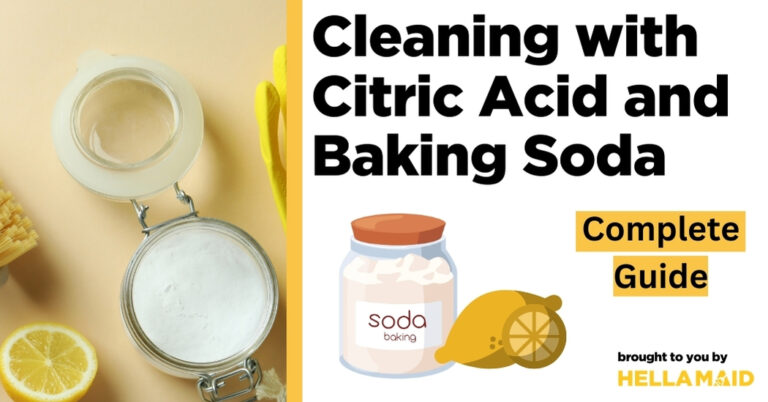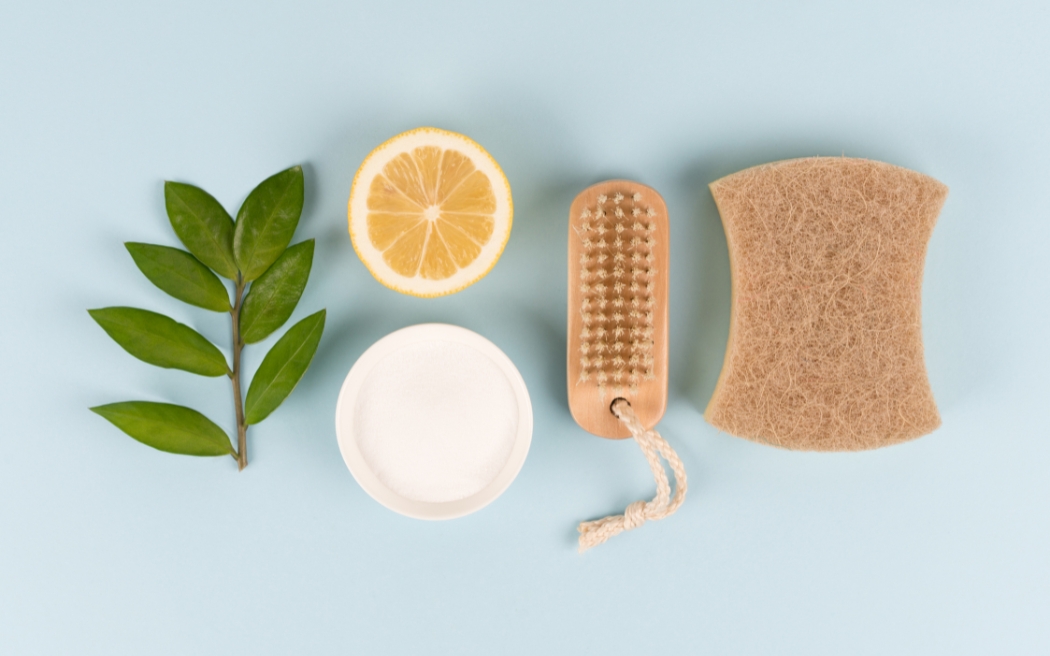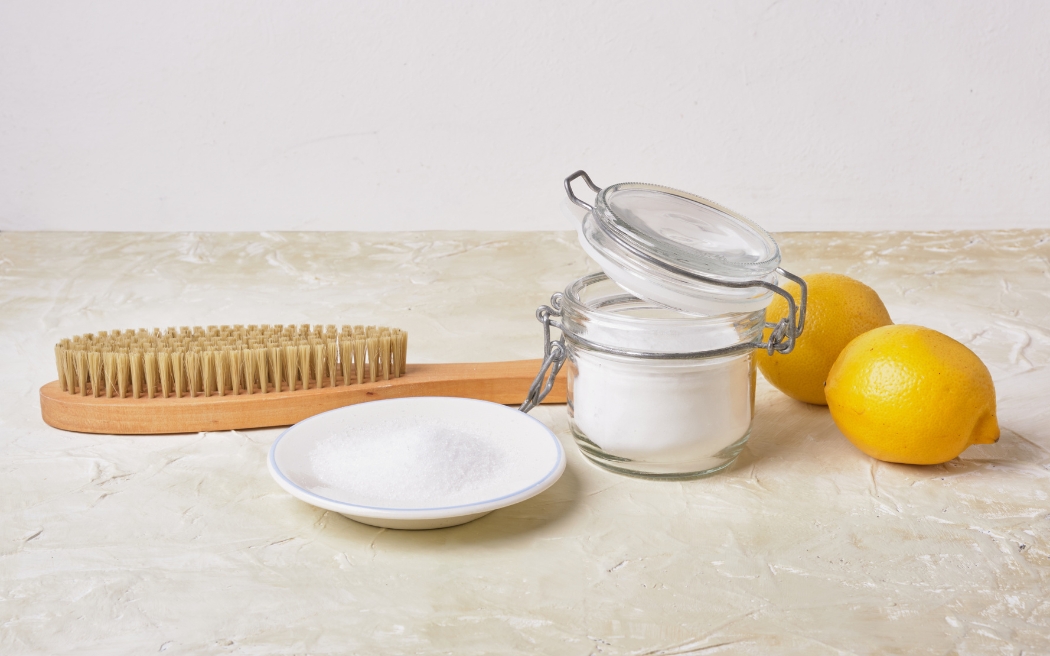Cleaning our homes often involves a plethora of chemical-laden products that might be effective but can also pose risks to our health and the environment. However, there’s a natural, cost-effective, and eco-friendly solution right in your kitchen cupboard – citric acid and also baking soda. These two ingredients, when combined, form a potent cleaning duo that tackles dirt, grime, and stains effectively. In this guide, we’ll explore the wonders of cleaning with citric acid and baking soda and how they can transform your cleaning routine.
Citric Acid and Baking Soda
Citric acid, a natural compound found in citrus fruits like lemons and oranges, possesses excellent cleaning properties. Its acidic nature makes it a powerful agent for breaking down stubborn stains, rust, and mineral deposits. On the other hand, baking soda, or sodium bicarbonate, is a mild alkali substance known for its ability to eliminate odors, act as a gentle abrasive, and lift dirt without causing damage to surfaces.
Can You Clean with Citric Acid and Baking Soda?
Aside from cleaning using vinegar and baking soda, citric acid and baking soda for cleaning purposes has gained popularity due to their effectiveness and eco-friendly nature. These natural ingredients offer powerful cleaning capabilities without the harsh chemicals found in many commercial cleaners. With their ability to remove stains, deodorize, and tackle grime, citric acid and baking soda are excellent options for various cleaning tasks around the house.
When combined or used separately, citric acid and baking soda serve as versatile cleaners for surfaces, appliances, fabrics, and more. However, it’s essential to understand their individual properties and the appropriate applications to achieve optimal cleaning results while ensuring the safety of surfaces and items being cleaned.
What to Clean with Citric Acid and Baking Soda
Knowing the right amounts of citric acid and baking soda to use for different cleaning tasks is essential for achieving effective results without wasting these ingredients. Here’s a guide on how much to use:
1. All-Purpose Cleaner
For an all-purpose cleaner, mix equal parts of citric acid and baking soda with water to form a paste or a solution. Typically, a ratio of 1 tablespoon of each ingredient to 1 cup of water works well. Adjust the amounts based on the surface area you’re cleaning.
2. Deodorizing Carpets and Upholstery
Sprinkle baking soda liberally over carpets and upholstery. Allow it to sit for at least 15-30 minutes to absorb odors before vacuuming. You can also add a few drops of essential oil to a box of baking soda for a pleasant scent.
3. Limescale Removal
For descaling purposes, mix 2-3 tablespoons of citric acid into a cup of warm water to create a solution. Soak affected areas like faucets, showerheads, or kettles in this solution for approximately 15-30 minutes. Adjust the solution strength as needed for heavier or lighter limescale build-up.
4. Kitchen Appliance Cleaning
Create a paste using baking soda and water for cleaning kitchen appliances like microwaves and ovens. Start with ¼ cup of baking soda and add water gradually until a spreadable paste consistency is achieved. Adjust the amount depending on the surface area you’re cleaning.
5. Laundry Boost
Add around ½ to 1 cup of citric acid or baking soda to your laundry load along with your regular detergent. Adjust the quantity based on the load size, the level of soiling, and water hardness.
6. Glass and Mirror Cleaning
Mix 2-3 tablespoons of citric acid into a spray bottle filled with water for cleaning glass surfaces and mirrors. Adjust the strength as necessary based on the cleaning required.
When Not to Clean with Citric Acid and Baking Soda
While citric acid and baking soda are versatile and effective natural cleaning agents, there are certain situations where using them might not be suitable:
- On Natural Stone Surfaces: Avoid using citric acid or baking soda on natural stone surfaces like cleaning limestone floor, marble, or granite. The acidic nature of citric acid and the abrasive properties of baking soda can cause etching or scratching on these surfaces, damaging their finish.
- Aluminum and Uncoated Cast Iron: Citric acid can react with aluminum, causing discoloration or damage. Similarly, when used in excessive amounts, baking soda might strip the seasoning off uncoated cast iron cookware.
- Sensitive or Delicate Materials: Avoid using these ingredients on sensitive or delicate materials that might react adversely to acidity or abrasiveness. Always perform a patch test on an inconspicuous area to ensure compatibility.
- Electronics and Electrical Appliances: Avoid using citric acid or baking soda on electronics or electrical appliances. Moisture from these substances might damage the internal components of such devices.
- Chemical Reactions with Certain Substances: Mixing citric acid or baking soda with certain substances, such as bleach or other acidic or alkaline cleaners, can lead to chemical reactions, releasing harmful gases or reducing cleaning effectiveness.
- Porous or Unsealed Surfaces: Baking soda might leave a residue on porous or unsealed surfaces, which can be challenging to remove and might cause discoloration.
Alternative Solutions to Citric Acid and Baking Soda
When citric acid and baking soda aren’t the best options for cleaning certain surfaces or items, several alternative natural cleaning solutions can be considered:
- For Natural Stone Surfaces: Use a mild dish soap diluted in water for cleaning natural stone surfaces like marble or granite. Ensure the soap is pH-neutral to prevent any damage to the stone.
- Aluminum and Cast Iron Cleaning: Instead of citric acid or baking soda, use mild dish soap or specialized cleaners recommended for these materials. Remember to follow the manufacturer’s instructions for care and maintenance.
- Sensitive Materials: Opt for mild, non-acidic cleaners specifically formulated for delicate materials. Microfiber cloths dampened with water or a mild soap solution can often suffice for gentle cleaning.
- Electronics and Electrical Appliances: Use dry microfiber cloths or specialized electronic cleaning wipes designed for safely cleaning electronics without moisture.
- Chemical-Free Cleaners: Explore ready-made eco-friendly cleaning solutions available on the market. Look for products that are labeled non-toxic, biodegradable, and free from harsh chemicals.
- Specialized Cleaners for Specific Surfaces: For surfaces requiring special care, such as stainless steel or glass, use cleaners specifically designed for these materials to ensure both effective cleaning and preservation.
Safety Tips
Although citric acid and baking soda are generally safe and natural cleaning agents, it’s important to observe certain safety measures while using them:
1. Protective Gear
Wear gloves and, if necessary, eye protection when handling concentrated solutions or when using citric acid and baking soda for prolonged periods to avoid skin irritation or accidental contact with eyes.
2. Ventilation
Ensure adequate ventilation when cleaning using citric acid and baking soda, especially in enclosed spaces. Proper airflow helps dissipate any fumes and prevents inhalation of airborne particles.
3. Avoid Mixing with Other Chemicals
Never mix citric acid or baking soda with other cleaning agents, especially bleach or ammonia. Such combinations can produce harmful gases or reduce cleaning effectiveness.
4. Keep Out of Reach of Children and Pets
Store citric acid and baking soda in a secure place, out of reach of children and pets, to prevent accidental ingestion or misuse.
5. Patch Testing
Always conduct a patch test in an inconspicuous area before using citric acid and baking soda on delicate or sensitive surfaces to ensure compatibility and prevent damage.
6. Rinsing Thoroughly
After using citric acid or baking soda for cleaning, ensure thorough rinsing to remove any residue. Residual substances might cause irritation or damage if left on surfaces.
7. Store Cleaning Products Properly
Store citric acid and baking soda in airtight containers away from moisture to maintain their effectiveness and prevent clumping.
8. Read Labels and Instructions
Follow instructions provided on packaging or guidelines from trusted sources when using citric acid and baking soda for cleaning to ensure safe and effective usage.
FAQs When Using Citric Acid and Baking Soda for Cleaning
As natural cleaning alternatives, citric acid and baking soda often raise questions about their usage, effectiveness, and safety. Here are some common queries answered:
1. Can I Mix Citric Acid and Baking Soda Together?
Answer: While both are effective cleaning agents, it’s generally not recommended to mix citric acid and baking soda together in a single solution. When combined, they neutralize each other’s cleaning properties, reducing their effectiveness. However, using them sequentially or in separate cleaning solutions is beneficial for various cleaning tasks.
2. Are Citric Acid and Baking Soda Safe for All Surfaces?
Answer: Citric acid and baking soda are safe for many surfaces, including cleaning kitchen countertops, tiles, glass, and stainless steel. However, it’s essential to perform a patch test on a small, inconspicuous area before using them on delicate surfaces to ensure they won’t cause damage.
3. Can Citric Acid and Baking Soda Replace Commercial Cleaners Completely?
Answer: While citric acid and baking soda are versatile and effective cleaners, they might not entirely replace specialized commercial cleaners for certain tasks. For heavy-duty cleaning or specialized surfaces, it’s advisable to use appropriate cleaners as recommended by manufacturers.
4. How Should I Store Citric Acid and Baking Soda?
Answer: Both citric acid and baking soda should be stored in airtight containers in a cool, dry place to maintain their effectiveness. Exposure to moisture can reduce their cleaning power over time.
5. Can I Use Citric Acid and Baking Soda for Cleaning in a Home with Pets or Kids?
Answer: Citric acid and baking soda are generally safe for homes with pets and kids due to their natural and non-toxic properties. However, it’s advisable to keep pets and children away from areas where you’re actively cleaning until the surfaces are rinsed thoroughly to prevent accidental ingestion.
Cleaning with citric acid and baking soda offers a safe, eco-friendly, and budget-friendly alternative to conventional cleaning products. Their versatility and effectiveness make them a go-to solution for various household cleaning needs. By harnessing the power of these natural ingredients, you can achieve a sparkling clean home while minimizing your environmental impact. Incorporate citric acid and baking soda into your cleaning routine and experience the transformative effects firsthand.
Embrace this natural cleaning powerhouse today and witness the difference it can make in maintaining a healthier and cleaner living environment.
Remember, a clean home doesn’t have to come at the expense of our health or the planet. With citric acid and baking soda, you can achieve cleanliness with a clear conscience.





























